Key takeaways
- Party affiliations are dynamic and influenced by historical events, personal experiences, and societal changes, such as the Civil Rights Movement and Hurricane Katrina.
- Louisiana’s government structure reflects its unique history, with significant power held by the Governor and a diverse legislative body that shapes local policies.
- Key events and shifts, including the rise of the Republican Party and changing demographics, have impacted political loyalties and community values in Louisiana.
- Researching political history through primary and secondary sources, as well as personal narratives, deepens understanding of how past events shape current political identities.
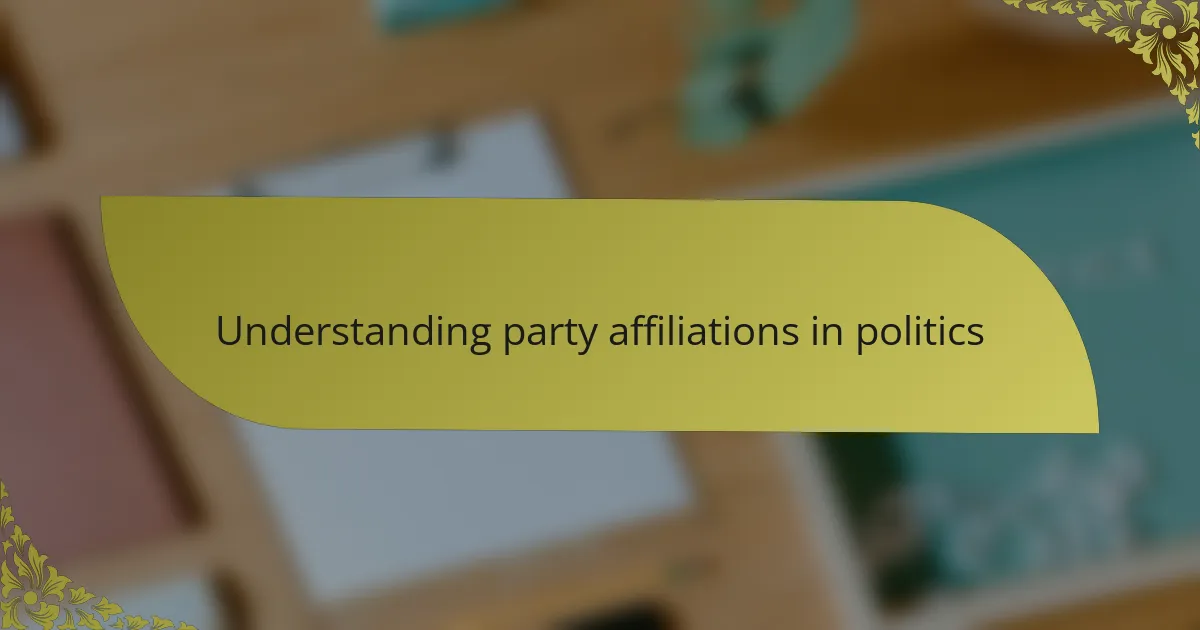
Understanding party affiliations in politics
Party affiliations play a pivotal role in shaping political landscapes, often reflecting broader societal values and beliefs. When I first delved into this topic, I was struck by how these affiliations are not just labels; they encapsulate the hopes, fears, and aspirations of different communities. Have you ever considered how your own beliefs align with a particular party, or how that might influence your view of key issues?
As I researched historical shifts, I realized how fluid these affiliations can be. There were moments when parties transformed, splintered, or realigned based on cultural movements or economic needs. I remember discussing this with a friend who openly switched parties after an election, expressing a feeling of disconnection with the platform they had previously supported. It made me question how often personal experiences can shift one’s political identity.
Understanding party affiliations requires examining the historical context behind them. For instance, what led to the transformation of ideologies within these parties? Reflecting on times of change, like the civil rights movement, it’s clear that party affiliations can be deeply intertwined with the quest for social justice. Engaging with these historical nuances not only enriches our understanding but also prompts us to think critically about our current political affiliations.
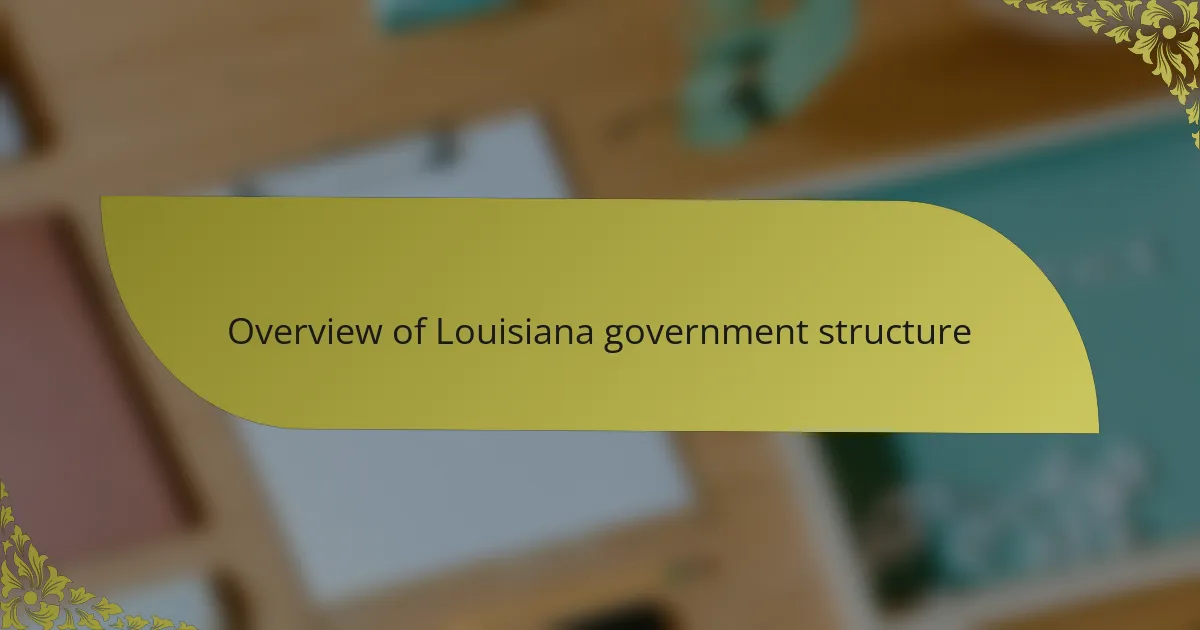
Overview of Louisiana government structure
The structure of Louisiana’s government is unique and deeply influenced by its history. With a system that includes executive, legislative, and judicial branches, Louisiana’s governance is a complex tapestry woven from both French and Spanish colonial legacies. I remember the first time I navigated the intricacies of this system; it felt almost like piecing together a puzzle that revealed not just politics but a story about the state itself.
At the head of the executive branch is the Governor, who holds significant power in shaping policy and implementing laws. This role intrigued me, especially when I learned how different governors have used their platforms to address local issues, making waves in our communities. Have you ever thought about how a single individual in such a position can steer the direction of a state?
The Legislative branch consists of the House of Representatives and the Senate, each playing a critical role in lawmaking. I found it fascinating to see how the diverse perspectives of these legislators, often reflecting the varied demographics of Louisiana, can lead to passionate debates on key issues. It made me realize how emotions and personal experiences can shape political discussions and ultimately influence the legislation that affects our everyday lives.
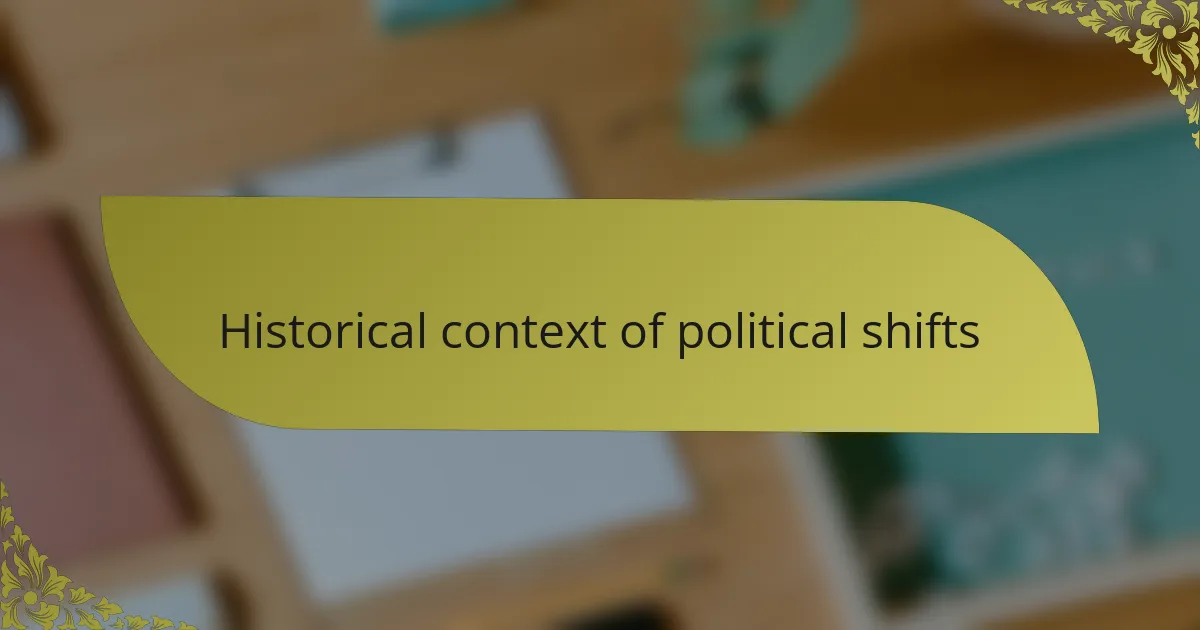
Historical context of political shifts
Political affiliations in Louisiana have undergone significant shifts, reflecting broader national trends while also displaying unique regional characteristics. Growing up in Louisiana, I often witnessed the deep-rooted loyalties to particular parties within my community. For instance, the once-solid Democratic base began fracturing in the late 20th century, as economic issues and shifting demographics played pivotal roles in reshaping these allegiances.
Throughout my research, I discovered that the state’s political landscape has frequently mirrored its turbulent history. The civil rights movement, economic changes, and even natural disasters have influenced voting patterns and party support. It’s fascinating how emotional connections to events can sway political opinions; I recall my family discussions around the dinner table that reflected fears and hopes tied to these significant shifts.
Here’s a straightforward comparison of the historical shifts in party affiliations in Louisiana:
| Time Period | Dominant Party |
|---|---|
| Pre-1960s | Democratic Party |
| 1960s-1980s | Republican Party gains traction |
| 1990s-2000s | Republican Party dominance |
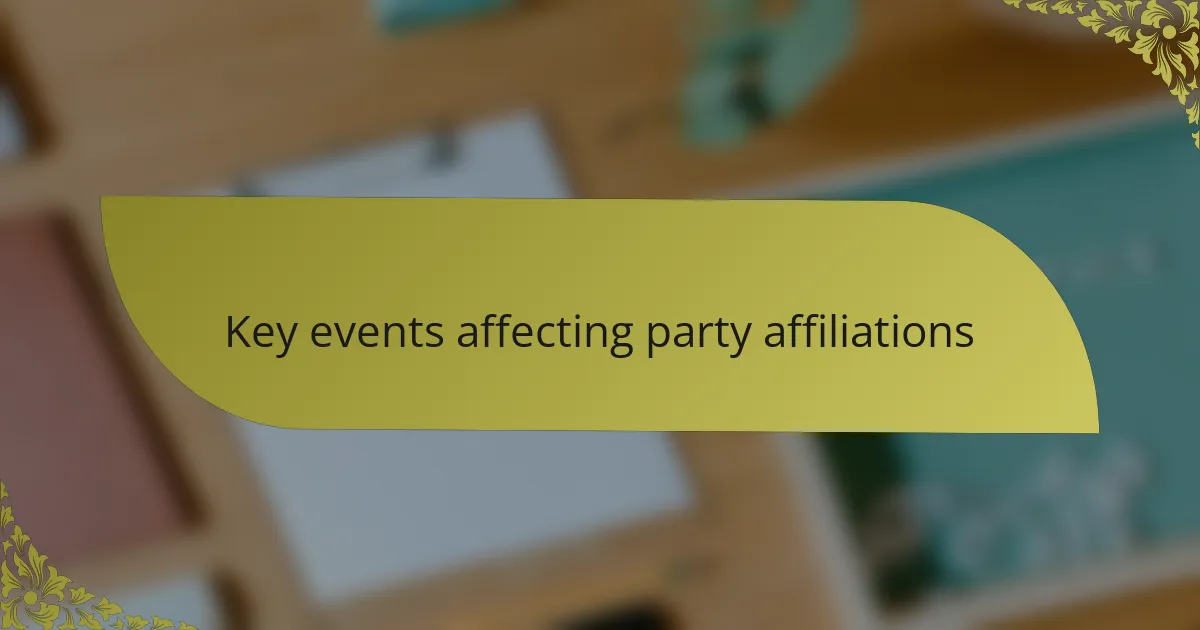
Key events affecting party affiliations
Throughout my research into historical shifts in party affiliations, I discovered several key events that dramatically altered the political landscape. For example, the Civil Rights Movement in the 1960s profoundly affected party loyalties in Louisiana, as many Southern Democrats found themselves at odds with the national party’s stance on civil rights. It was eye-opening to realize how these national-level changes reverberated into local politics and shaped personal identities.
Another significant event was Hurricane Katrina in 2005, which not only devastated New Orleans but also prompted a reevaluation of party platforms regarding disaster response and recovery. Witnessing the aftermath and how communities rallied—or struggled—under different party leadership gave me a deeper understanding of political accountability and the nuances in how party affiliation can reflect community values.
- Civil Rights Movement (1960s): Sparked a shift of Southern Democrats to the Republican Party.
- Federal involvement in welfare programs: Influenced public perception of party effectiveness.
- Hurricane Katrina (2005): Highlighted the role of local governance in disaster response and reshaped party dynamics in Louisiana.
- The election of Barack Obama (2008): Engendered renewed interest and engagement in politics among younger voters in Louisiana.
- Changing demographics: As the population became more diverse, the priorities of political parties also evolved in an effort to reach broader audiences.
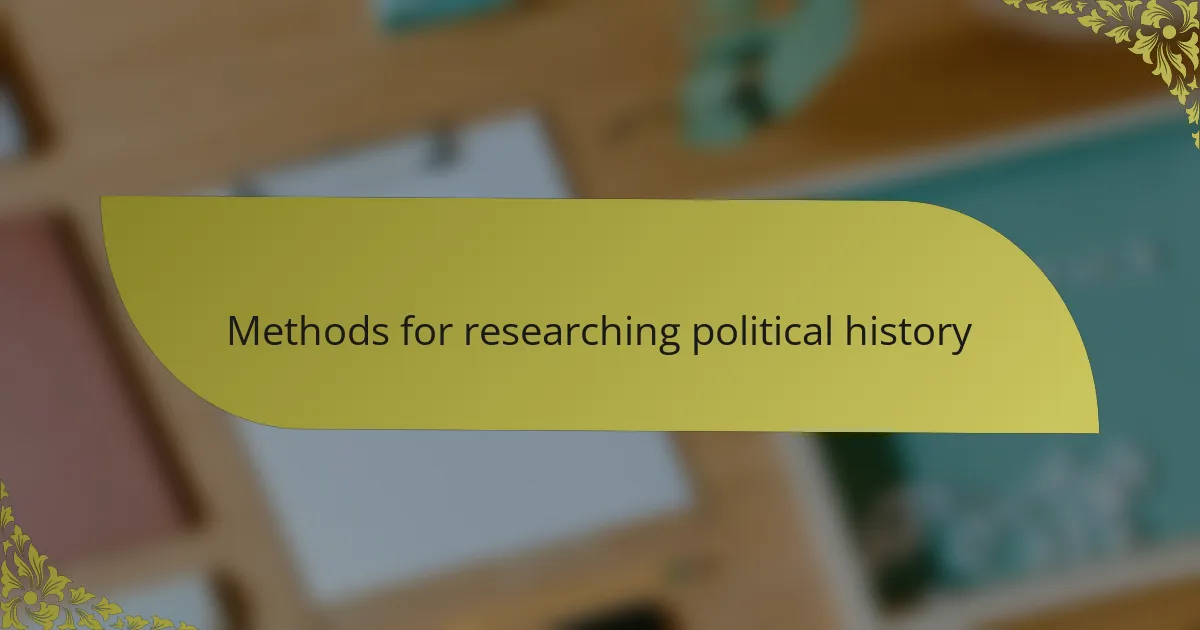
Methods for researching political history
Researching political history can initially seem daunting, but I found that the right methods can make it a fulfilling journey. One effective approach is to delve into primary sources, such as old newspaper articles or political speeches. These documents provide raw insights into the sentiments of the era, offering a glimpse of community emotions that influenced party affiliations. I recall poring over archival materials in a local library, discovering moments that felt like stepping back in time.
Another valuable method is to engage with secondary sources like scholarly articles or historical analyses. These resources contextualize the raw data, enabling a richer understanding of how events shaped political landscapes. I remember reading about how historians tied Louisiana’s political shifts to broader national trends while also highlighting unique local factors. It was enlightening to see how academics connect the dots in ways that I hadn’t considered.
Lastly, conducting interviews with long-time residents or local political analysts can unveil personal stories that add depth to the historical narrative. I’ve spoken with individuals who experienced these party shifts firsthand, and their anecdotes filled in the gaps that textbooks often leave out. Their experiences made me question how our personal histories intertwine with the larger political narrative. Have you ever had a conversation that changed your perspective on an issue? Hearing their stories has certainly shaped mine.

Personal reflections on research journey
Embarking on my research journey into historical shifts in party affiliations was both enlightening and at times overwhelming. As I sifted through various sources, I found myself emotionally connected to the narratives of individuals who lived through these transformations. For instance, I spoke with an older relative who recalled his own political awakening during the civil rights era. His passionate recounting of events made me realize how these shifts aren’t just academic; they profoundly impact real lives.
I vividly remember standing in the local archives, surrounded by dusty books and old newspapers. It felt like unearthing hidden treasures of the past, each article revealing stories of hope, struggle, and transformation. I often caught myself pondering, how did these events shape the beliefs I hold today? The realization that party affiliations can ebb and flow based on personal experiences was both fascinating and a bit unsettling.
Every so often, I would stumble upon unexpected connections that prompted deep reflection. For example, Katrina’s aftermath wasn’t just a chapter in a history book; it was a moment that reshaped community bonds and political identities. Listening to others recount their experiences during that time made me think: how much do our crises define our allegiances? It’s clear that our political landscapes are not just shaped by policies but by the very fabric of our shared experiences.
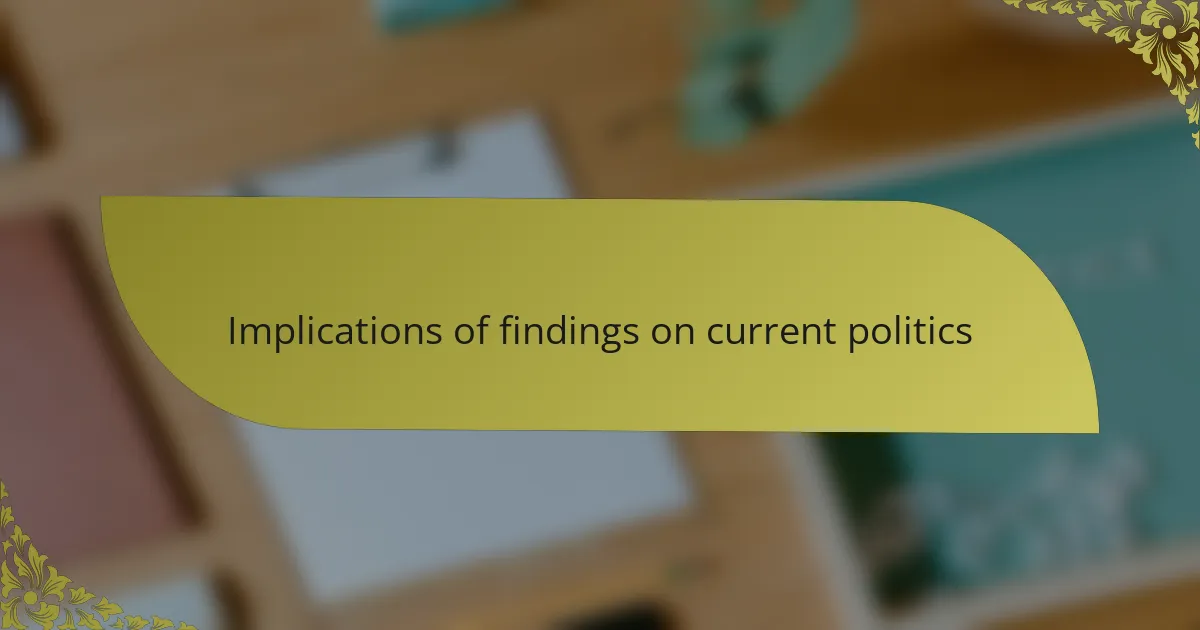
Implications of findings on current politics
Political affiliations in Louisiana today reflect the historical shifts I’ve researched, indicating the dynamic nature of party loyalty. For example, the Republican Party’s rise began as a response to the Democratic Party’s stance during the Civil Rights Movement. I often think back to conversations I’ve had with friends who switched parties, expressing feelings of disconnection with the values they once embraced. Isn’t it intriguing how personal experiences can shape these shifts, often leading to broader societal changes?
Moreover, events like Hurricane Katrina have shown the importance of party platforms in addressing local challenges. Observing how various party leaders responded—or failed to respond—after the disaster revealed much about political accountability. I remember discussing with a neighbor how the aftermath not only highlighted the need for effective governance but also influenced people’s voting habits. Can we agree that the way a party handles crises can significantly impact its support?
Additionally, the changing demographics in Louisiana add another layer to current political interactions. As communities evolve, so do the priorities of political parties, driven by the need to resonate with a more diverse electorate. Reflecting on my own experiences at community events, I’ve noted how discussions around local issues often pivot heavily on these demographic shifts. It makes me wonder: how often do we consider the role of our own backgrounds when engaging with politics?